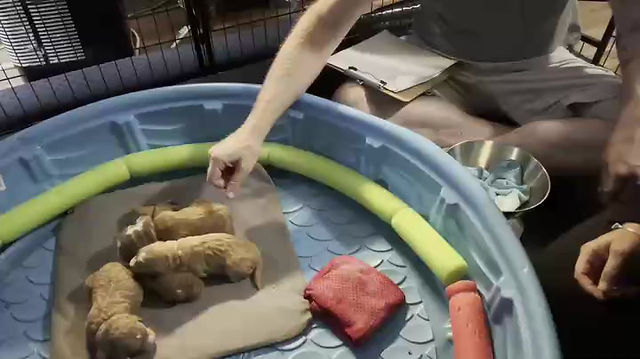ENS: Early Neurological Stiulation
ENS: What is it?
Early Neurological Stimulation (ENS), or the Bio Sensor program, is a technique used by some breeders to introduce mild stressors to puppies in their early development, from days 3-16 after birth. These stressors, applied for a few seconds each day, are believed to improve the puppy's stress response and overall development later in life.
The ENS process involves five simple exercises:
-
Head down: Holding the puppy upside down, supporting the body, for 3-5 seconds.
-
Supine position: Holding the puppy on its back, with its muzzle facing up, for 3-5 seconds.
-
Thermal stimulation: Placing the puppy on a cool, damp towel for a few seconds.
-
Tactile stimulation: Gently tickling between the puppy's toes with a Q-tip for 3-5 seconds.
-
Head held erect: Holding the puppy upright, supporting under the front legs, for 3-5 seconds.
Benefits of ENS are thought to include:
Improved cardiovascular health, Stronger heartbeats, More robust adrenal glands, Increased stress tolerance, and Enhanced immune system function.
ENS: How is it done?
ENS: What are the benefits?
Short Video of our process!

VOLHARD TEST
TEMPERAMENT TESTING


What is the Volhard test?
The Volhard “Puppy Aptitude Test or “PAT” was created by Joachim and Wendy Volhard as a way to test behavioral tendencies and predict what a puppy will be like as an adult also commonly called a “Puppy Temperament Test” or “Puppy Personality Test”. The test is ideally performed on puppies at 49 days old (7 wks).
How is the test performed?
The Volhard Puppy Aptitude Test, or PAT. PAT uses a scoring system from 1-6 and consists of ten tests. The tests are done consecutively in the order listed. Each test is scored separately, and interpreted on its own merits. The scores are not averaged, and there are no winners or losers. The entire purpose is to select the right puppy for the right home.
The tests are as follows:
1. Social Attraction - degree of social attraction to people, confidence or dependence.
2. Following - willingness to follow a person.
3. Restraint - degree of dominant or submissive tendency, and ease of handling in difficult situations.
4. Social Dominance - degree of acceptance of social dominance by a person.
5. Elevation - degree of accepting dominance while in a position of no control, such as at the veterinarian or groomer.
6. Retrieving - degree of willingness to do something for you. Together with Social Attraction and Following a key indicator for ease or difficulty in training.
7. Touch Sensitivity - degree of sensitivity to touch and a key indicator to the type of training equipment required.
8. Sound Sensitivity - degree of sensitivity to sound, such as loud noises or thunderstorms.
9. Sight Sensitivity - degree of response to a moving object, such as chasing bicycles, children or squirrels.
10. Stability - degree of startle response to a strange object.
What does the test look like?


What Do The Scores Mean?
The scores are interpreted as follows:
Mostly 1’s – Strong desire to be pack leader and is not shy about bucking for a promotion Has a predisposition to be aggressive to people and other dogs and will bite Should only be placed into a very experienced home where the dog will be trained and worked on a regular basis. Top Dog Tips: Stay away from the puppy with a lot of 1’s or 2’s. It has lots of leadership aspirations and may be difficult to manage. This puppy needs an experienced home. Not good with children.
Mostly 2’s – Also has leadership aspirations May be hard to manage and has the capacity to bite Has lots of self-confidence Should not be placed into an inexperienced home Too unruly to be good with children and elderly people, or other animals Needs strict schedule, loads of exercise and lots of training. Has the potential to be a great show dog with someone who understand dog behavior
Mostly 3’s – Can be a high-energy dog and may need lots of exercise Good with people and other animals Can be a bit of a handful to live with Needs training, does very well at it and learns quickly Great dog for second time owner.
Mostly 4’s – The kind of dog that makes the perfect pet Best choice for the first-time owner. Rarely will buck for a promotion in the family Easy to train, and rather quiet Good with elderly people, children, although may need protection from the children Choose this pup, take it to obedience classes, and you’ll be the star, without having to do too much work! Tidbits: The puppy with mostly 3’s and 4’s can be quite a handful, but should be good with children and does with training. Energy needs to be dispersed with plenty of exercise.
Mostly 5’s – Fearful, shy and needs special handling. Will run away at the slightest stress in its life. Strange people, strange places, different floor or ground surfaces may upset it. Often afraid of loud noises and terrified of thunder storms. When you greet it upon your return, may submissively urinate. Needs a very special home where the environment doesn’t change too much and where there are not children. Best for quiet, elderly couple. If cornered and cannot get away, has a tendency to bite. Top Dog Tips: Avoid the puppy with several 6’s. It is so independent it doesn’t need you or anyone. He is his own person and unlikely to bond to you.
Mostly 6’s – So independent that he doesn’t need you or other people. Doesn’t care if he is trained or not – he is his own person. Unlikely to bond to you, since he doesn’t need you. A great guard dog for gas stations! Do not take this puppy and think you can change him into a lovable bundle – you can’t, so leave well enough alone.
